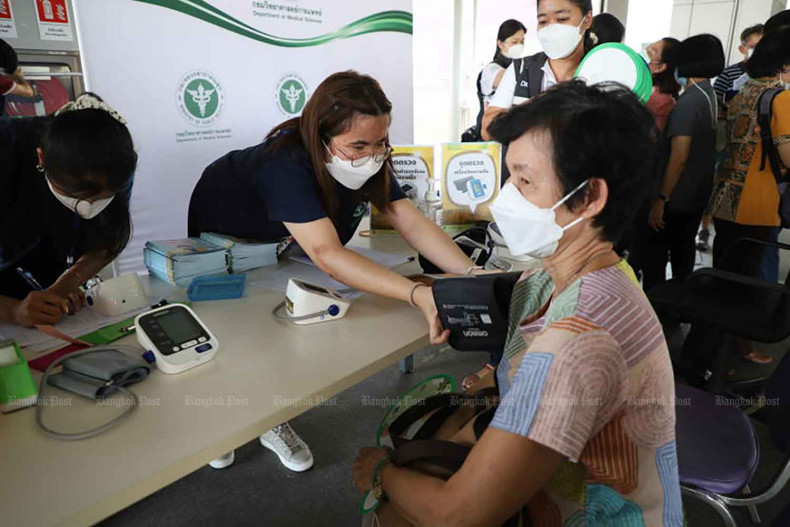High blood pressure is the leading health issue among Thai outpatients.
November 3, 2024

In 2023, officials from the Department of Medical Sciences offered free blood pressure and oxygen level tests at the Ministry of Public Health station on the MRT Purple Line in Nonthaburi.
According to the National Health Security Office (NHSO) of Thailand, high blood pressure emerged as the predominant medical condition among outpatients utilizing universal healthcare services in 2023. This finding highlights the significant health challenge posed by hypertension in the country, emphasizing the need for ongoing awareness and management strategies to address this prevalent issue.
In a statement made on Sunday, NHSO Secretary-General Dr. Jadet Thammathataree revealed that for the fiscal year 2023, a substantial budget of 99.7 billion baht was allocated to provide healthcare services for 47.727 million eligible Thai citizens. This funding equates to an average of 3,385.98 baht per individual, reflecting the government’s commitment to ensuring accessible healthcare for a large segment of the population.
Breaking down this budget further, Dr. Thammathataree noted that the allocation for outpatient services was set at 1,344.40 baht per person, while the budget for inpatient care amounted to 1,477.01 baht per capita. These figures illustrate the government’s focus on both outpatient and inpatient care, aiming to provide comprehensive medical support and treatment for various health conditions, particularly those as common and concerning as high blood pressure.
In 2023, the universal healthcare scheme, commonly referred to as the gold card scheme, was utilized 170.39 million times by outpatients, averaging 3.63 visits per person per year. This marks an increase from 2.45 visits per person per year in 2003, the year the scheme was introduced.
Dr. Jadet Thammathataree reported that the top ten health issues among outpatients using the gold card service included high blood pressure, followed by non-insulin-dependent diabetes mellitus, disorders related to lipoprotein metabolism and other blood lipid conditions, influenza, chronic kidney failure, various soft tissue disorders, dental caries, indigestion, other muscle disorders, and gingivitis and periodontitis.
Regarding inpatient services, the universal healthcare scheme recorded 6.09 million visits, an increase from 4.30 million in 2003.
The most common conditions treated included gastritis and enteritis, followed by pneumonia, chronic kidney failure, various chronic obstructive pulmonary diseases, heart failure, thalassemia, cerebral infarction, non-insulin-dependent diabetes, and urinary system disorders.
Dr. Jadet Thammathataree stated, “This data demonstrates the public’s access to comprehensive and widespread healthcare, which helps alleviate financial burdens. Additionally, it provides vital public health information and empirical evidence that can be leveraged for health promotion and disease prevention initiatives aimed at reducing illnesses in the future.”
Source: bangkokpost.com
Abhy Reyes is an experienced SEO specialist dedicated to boosting online visibility and driving organic growth for brands. Skilled in on-page and off-page SEO, technical optimization, and content strategy, Abhy crafts data-driven solutions that enhance search rankings and user engagement. With a keen eye on industry trends, Abhy ensures every SEO approach is both innovative and effective, delivering measurable results tailored to each client’s goals.
